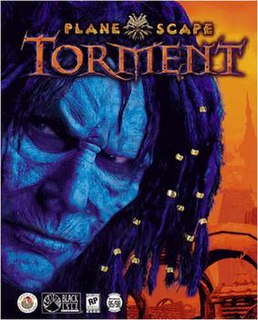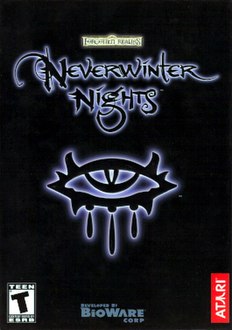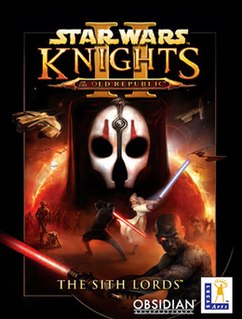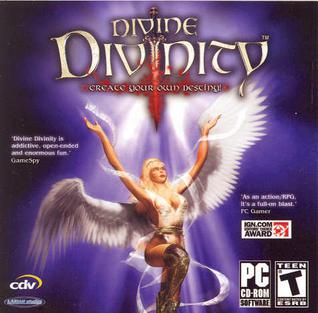
Planescape: Torment is a role-playing video game developed by Black Isle Studios and published by Interplay Entertainment. Released for Microsoft Windows on December 12, 1999, the game takes place in locations from the multiverse of Planescape, a Dungeons & Dragons (D&D) fantasy campaign setting. The game's engine is a modified version of the Infinity Engine, which was used for BioWare's Baldur's Gate, a previous D&D game set in the Forgotten Realms.

Neverwinter Nights is a third-person role-playing video game developed by BioWare. Interplay Entertainment was originally set to publish the game, but financial difficulties led to it being taken over by Infogrames, who released the game under their Atari range of titles. It was released for Microsoft Windows on June 18, 2002. BioWare later released a Linux client in June 2003, requiring a purchased copy of the game to play. MacSoft released a Mac OS X port in August 2003.

Eye of the Beholder is a role-playing video game for personal computers and video game consoles developed by Westwood Associates. It was published by Strategic Simulations, Inc. in 1991 for the MS-DOS operating system and later ported to the Amiga, the Sega CD and the SNES. The Sega CD version features a soundtrack composed by Yuzo Koshiro. A port to the Atari Lynx handheld was developed by NuFX in 1993, but was not released. In 2002, an adaptation of the same name was developed by Pronto Games for the Game Boy Advance.

Icewind Dale is a role-playing video game developed by Black Isle Studios and originally published by Interplay Entertainment for Windows in 2000 and by MacPlay for the Macintosh in 2002. The game takes place in the Dungeons & Dragons Forgotten Realms campaign setting and the region of Icewind Dale, and utilises the 2nd edition ruleset. The story follows a different set of events than those of R. A. Salvatore's The Icewind Dale Trilogy novels: in the game, an adventuring party becomes enlisted as a caravan guard while in Icewind Dale, in the wake of strange events, and eventually discover a plot that threatens the Ten Towns of Icewind Dale and beyond.

Carmageddon II: Carpocalypse Now is a vehicular combat video game, the sequel to Carmageddon, and released in 1998 for Microsoft Windows. The game was developed by Stainless Games and published by Sales Curve Interactive in Europe and Interplay Entertainment in North America. Ports for Mac OS, PlayStation and Nintendo 64 were released in 1999. A 2D version for the Game Boy Color was released in 2000.

Star Wars: Knights of the Old Republic II – The Sith Lords is a role-playing video game developed by Obsidian Entertainment and published by LucasArts. It is the sequel to BioWare's Star Wars: Knights of the Old Republic and was released for the Xbox on December 6, 2004, for Microsoft Windows on February 8, 2005, and OS X and Linux on July 21, 2015. Like its predecessor, it is set in the Star Wars universe 4,000 years before the events of the film Episode I: The Phantom Menace and is based on the d20 System developed by Wizards of the Coast. The game uses the Odyssey Engine, which was originally used in Knights of the Old Republic. The plot first started being written before the original Knights of the Old Republic was released, and development began in October 2003, after BioWare offered Obsidian their Star Wars license due to being confident in their previous work.

The Elder Scrolls IV: Oblivion is an open-world action role-playing video game developed by Bethesda Game Studios and published by Bethesda Softworks and the Take-Two Interactive division 2K Games. It is the fourth installment in The Elder Scrolls action fantasy series, following The Elder Scrolls III: Morrowind and preceding The Elder Scrolls V: Skyrim. The game was released for Microsoft Windows and Xbox 360 in March 2006, and on PlayStation 3 in March 2007, with a mobile version of the game released on May 2, 2006. Taking place within the fictional province of Cyrodiil, Oblivion's main story revolves around the player character's efforts to thwart a fanatical cult known as the "Mythic Dawn" that plans to open portal gates to a demonic realm known as "Oblivion". The game continues the open-world tradition of its predecessors by allowing the player to travel anywhere in the game world at any time and to ignore or postpone the main storyline indefinitely. A perpetual objective for players is to improve their character's skills, which are numerical representations of certain abilities. Early in the game, seven skills are selected by the player as major skills for their character, with those remaining termed as minor skills.

Star Wars: Force Commander is a real-time strategy video game released for the Microsoft Windows platform on March 21, 2000. It was co-developed by Ronin Entertainment and LucasArts, and published by LucasArts. Its plot interweaves between Star Wars: A New Hope and Return of the Jedi, taking in key battles. Peter McConnell created remixed tracks of John Williams' original score using influenced from hard rock and techno music.

Summoner is a Western action role-playing (RPG/WRPG) video game developed by Volition and published by THQ. It was released as a launch title for the Sony PlayStation 2 in 2000, and was subsequently ported to Microsoft Windows and Mac OS the following year. In the game, the player plays the role of Joseph and can assemble a team of compatriots and summon powerful monsters. The game has a world map, involved storyline, and unique hybrid combat system involving real-time and turn-based mechanisms.

Divine Divinity is an action role-playing game developed by Larian Studios and published by cdv Software Entertainment for Microsoft Windows, which was released in September 2002. It has three sequels, Beyond Divinity, Divinity II, and Divinity: Original Sin II. It also has a prequel, Divinity: Original Sin, and a spin-off, Divinity: Dragon Commander.

Lords of EverQuest is a 3D fantasy real-time strategy game released in December 2003. It was developed by the short-lived startup company Rapid Eye Entertainment and published by Sony Online Entertainment (SOE). SOE distributes Lords of EverQuest.

Dungeons & Dragons Online (DDO) is a massively multiplayer online role-playing game (MMORPG) developed by Turbine for Microsoft Windows and OS X. The game was originally marketed as Dungeons & Dragons Online: Stormreach, then renamed Dungeons & Dragons Online: Eberron Unlimited upon switching to a hybrid free to play model, and was finally rebranded Dungeons & Dragons Online, with the introduction of Forgotten Realms-related content. Turbine developed DDO as an online adaptation of Dungeons & Dragons (D&D), based loosely on the D&D 3.5 rule set. The game is set on the unexplored continent of Xen'drik within the Eberron campaign setting, and in the Kingdom of Cormyr within the Forgotten Realms campaign setting.
Heuristic Park, Inc. is an American video game development company founded in 1995 by David W. Bradley. The company is based in Atlanta, Georgia. It was founded after Bradley left Sir-Tech.

Arx Fatalis is an action role-playing video game for the Xbox and Microsoft Windows, published by Arkane Studios, a video game developer based in Lyon, France.

Beyond Divinity is a role-playing video game from Larian Studios, a sequel to Divine Divinity that was released in 2004.

Titan Quest is an action role playing hack and slash video game developed by Iron Lore Entertainment for Microsoft Windows personal computers. It was published by THQ in 2006. It was released on Steam in 2007, and later ported to mobile devices by DotEmu and released in 2016; later versions were published by THQ Nordic. Versions for PlayStation 4, Xbox One and Nintendo Switch were released in 2018. The story follows a player-created protagonist as they navigate Ancient Greece, Egypt and China on a quest to defeat the Titans after they escape from their ancient prison. The gameplay is similar to the Diablo series, with player navigation being handled with a mouse-driven tile-based interface, and gameplay revolving around role-playing mechanics and real-time combat. Three expansions were released for the game: Titan Quest: Immortal Throne in 2007, Titan Quest: Ragnarök in 2017 and Titan Quest: Atlantis in 2019.

The Chronicles of Narnia: The Lion, the Witch and the Wardrobe is an action-adventure game released in 2005 by Traveller's Tales. The game is based on the novel-adapted movie of the same name. It was released in November before the movie for most major consoles including the GameCube, PC, Xbox, PlayStation 2, Nintendo DS, and Game Boy Advance.

Neverwinter Nights 2: Mysteries of Westgate (NWN2:MoW) is an expansion pack for the role-playing video game Neverwinter Nights 2. It was developed by Ossian Studios and published by Atari on April 29, 2009. The player creates a character and controls it, along with a group of three pre-designed companions, journeying through the game world. The gameplay is very similar to that of the base game. Mysteries of Westgate also includes new monsters, music, and other tools, which can be used by players to create their own Neverwinter Nights 2 levels.

Lock's Quest is a real-time strategy-tower defense video game developed by 5th Cell and published by THQ. It is 5th Cell's second Nintendo DS game. It was released in North America on September 8, 2008, in Europe on September 26, 2008 and in Australia on September 25, 2008.

Wizards & Warriors is a role-playing video game for Microsoft Windows designed by David W. Bradley.




















